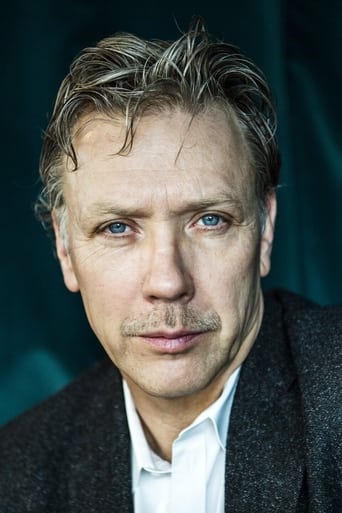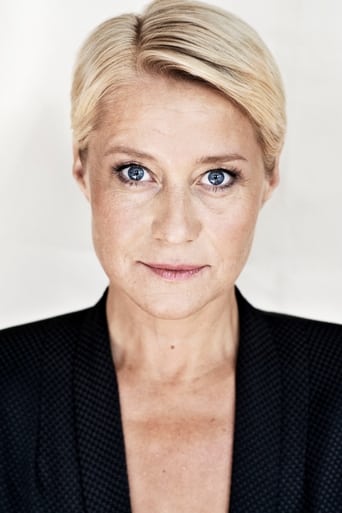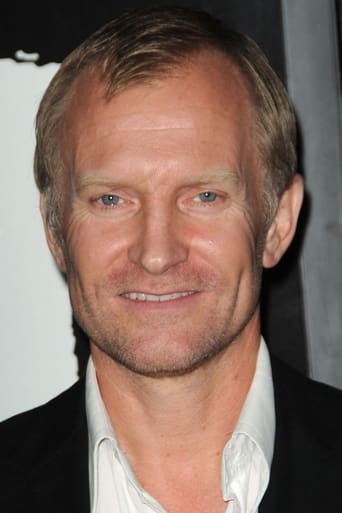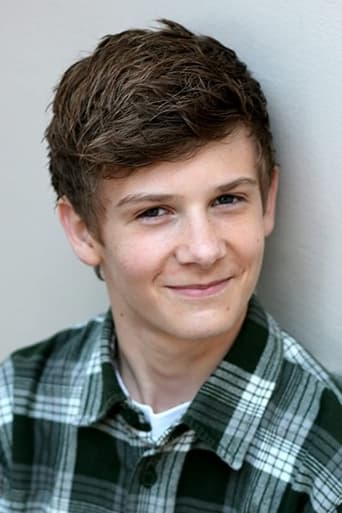Dorathen
Better Late Then Never
AshUnow
This is a small, humorous movie in some ways, but it has a huge heart. What a nice experience.
Scarlet
The film never slows down or bores, plunging from one harrowing sequence to the next.
Cristal
The movie really just wants to entertain people.
jadavix
It must be very difficult for filmmakers to deal with topics like bullying without going over the top. Consider two other Scandinavian movies that deal with this subject: Before the Storm and the totally ostentatiously titled "Evil". Both make the uneasy comparison between schoolyard bullying and acts of war, and, perhaps to try to justify it, both go straight for unrealistically excessive acts of violence in the schoolyard, thereby leaving realism behind."In a Better World" is another example of this. It features a preteen victim of bullying who goes straight to escalating violence so quickly and remorselessly he may well be a sociopath. The portrayal is also so grim and emotionless that I thought I was watching another Omen sequel. Indeed, after police involvement one might inspect the average 12 year old would cave from fear and pressure. Not our 12 year old. The movie also features an explosion, the results of which, on a purely scientific level, are quite unrealistic. What is it with audiences lapping up movies like this? I guess if you bring in big issues like crises in war torn countries and violence at home, people will assume they are seeing a Very Important Movie and act accordingly. The scenes set in Africa are there to make such a facile comparison with the at-home action that I wonder if the filmmakers knew and worked from some kind of Powerful Film by Numbers kit.
Turfseer
"In a Better World," the Academy's 2011 Best Foreign Film winner, is Danish director Susanne Bier's meditation on vigilante justice. The focus is on two children, Elias and Christian, who develop anti-social tendencies due to problems going on with troubled parents at home.Elias's father, Anton, a Swedish doctor, is separated from his mother, Marianne, after she discovers he's been having an affair with another woman. Anton spends a good deal of time working as a physician in a Doctors Without Borders refugee camp in Sudan. Christian's father, Claus, has just moved the family back to Denmark from London following the death of his wife. Christian blames Claus for lying to him that his mother would get well and also accuses him of wishing that she would die in the later stages of her illness.The bulk of the plot involves Christian befriending Elias at the local school, after Elias is subject to severe bullying by classmates, particularly one Sofus, Elias's main tormentor. Christian metes out vigilante justice to Sofus, beating him with a pipe and putting a knife to his throat. Christian clearly realizes the school authorities will do nothing to stop the bullies under their charge and their impotence is reflected in Marianne's complaints to the school administrators, who she blames for doing nothing to stop the violence. Biers asks at this point, should we admire Christian for taking the law into his own hands to prevent further violence, or is his use of a knife a troubling portent of things to come?Sure enough, a second incident leads to escalating tension and violence. When Anton separates his younger son from another bullying child in a playground, the bullying child's father, a gruff car mechanic, threatens Anton, upset that Elias' father touched his son, in his effort to separate the two brawling children. Anton won't take the bait and get into a physical confrontation with the car mechanic. Christian convinces Elias that his father is a "wimp" for not physically confronting the car mechanic and in a more sinister turn, hatches a plot to blow up the car mechanic's van with a pipe bomb. Perhaps the most engaging aspect of Beer's narrative is the portrait of the more than troubled Christian, whose demeanor rivals older individuals, who engage in psychopathic behavior. Indeed, the steely Christian (played by an excellent William Jøhnk Juels Nielsen), truly comes off as a despicable and scary youngster, reminiscent of some of the sinister characters hatched in American high schools, responsible for mass killings.When Elias is hurt during the pipe bomb blast of the car mechanic's car, Christian's outlook takes an unlikely turn where he blames himself for his friend's injury, to the point where he's on the verge of suicide (it takes some quick thinking on Anton's part, to find the boy and save him).Meanwhile, back at the refugee camp, Beers argues that there are limits to pacifism. A local warlord, blamed for a slew of atrocities amongst the populace, shows up with his machine gun toting thugs, and demand that Anton treat a severe case of gangrene which has affected his leg. When the warlord claims responsibility for sexually abusing one of the women whom Anton has been treating in his make-shift hospital, Anton has had enough, drags the man outside where a mob of local villagers, beat him to death. The scene doesn't quite work as the warlord's confederates seem to shrink away and allow the angry mob to do their boss in.While Ms. Beers' nuanced exploration of vigilantism may lead one down a path of troubling cognitive dissonance for the viewer, her decision to tie the overall narrative up with an unlikely happy ending is not a good one. Indeed, I had a hard time buying that Christian would suddenly become a respectable member of the community, given the slippery slope he had already gone down. Are psychopaths so easily redeemed? I think not. And some of the other "feel-good" resolutions also felt a little too pat (Elias' miracle recovery and the reconciliation between Anton and Marianne). "In a Better World" raises troubling questions about vigilante justice and features some excellent performances, particularly from the two child protagonists. Nonetheless, director Beers' denouement unfortunately is not consistent with her earlier tale of alarming psychopathy run amok.
eespeysundt
The grass is always greener on the other side - or isn't it? In a Better World, directed by Susanne Bier, presents the stories of characters who seem to be trapped between two worlds. We begin our journey with Anton (Mikael Åke Persbrandt), who works as a humanitarian aid doctor in an African refugee camp. Anton and his wife, Marianne (Trine Dyrholm), face marital problems and are able to avoid dealing with each other for large amounts of time by working on different continents. The couple argues, but the relationship takes a hopeful tone through mishaps involving their oldest son Elias (Markus Rygaard). The film also explores the life of Claus (Ulrich Thomsen), a businessman who recently lost his wife to cancer. Claus spends the majority of his time traveling to London for work, so his son Christian (William Jøhnk Nielsen) lives with his grandmother in Denmark after the passing of his mother. The two stories parallel each other and become connected through Elias and Christian. Christian and Elias quickly find companionship with each other. Both are portrayed as outcasts from the group, Elias because of his appearances and mannerisms, and Christian because of his status as the new kid at school. Together they endure bullying by an older classmate and struggle to find appropriate ways to deal with their difficulties at school.Their actions, spearheaded by Christian, have huge consequences on the boys' lives and present the idea of power and authority. Elias wants desperately to be accepted, and is willing to do anything to maintain his new friendship even if it means going against his parents and his better judgement. Nonetheless, the theme of companionship evolves as the two boys work together to find meaning if their lives and to navigate their complicated and tumultuous family situations. The main themes of conflict, loyalty, and morality blend together within the action of the film. The film is vague regarding the whereabouts of the refugee camp, however it is clear that the population there faces attacks from rival groups. When the film shifts back to Denmark it is apparent that the characters also face conflict. But rather than enduring physical harm, they are subject to intense emotional conflict in their relationships. I am unsure as to whether Bier intended for viewers to see the conflicts as similarities between both nations in that they are equally taxing on their populations, or if the intention was for viewers to recognize that people suffer grave injustices everyday that we cannot even begin to understand due to our privileges and opportunities in life. Loyalty and morality are explored through several relationships and characters are forced to make decisions that they are clearly unsure or unhappy about. For example, Anton struggles immensely with his decision to help the man who is responsible for killing and injuring so many innocent young women. He walks away from the situation unnerved about whether his actions are justifiable, but feels more secure with his decision when his actions prove his loyalty to the refugee population that he is there to help. Similarly, Elias struggles with his decision to join Christian in his plans to get retribution for themselves and for Anton. He recognizes that he goes against his better judgement, but cannot escape the situation without losing his only friend. To a certain extent, Christian also faces the dilemma of going against his family's values, but ultimately his disappointment and anger towards his father negate the sense of loyalty he feels towards respecting his father's authority. The dialogue, while appropriate and understandable, was sometimes unexpected or lacking. I thought about this mostly in relation to Anton's dialogue with the boys about with the mechanic, and how that part of the story seemed to stop abruptly even though it remained crucial to the storyline. Background noises such as wind chimes, wind gusts, rolling waves, and moving vehicles created a natural and realistic environment. This is especially true when paired with the wide landscape shots. The film showcased the landscapes of both worlds present within the film. During the transitions these landscapes even seemed to blend together sometimes, but were eventually recognizable by several factors such as color and types of structures that became visible. Susanne Bier is an accomplished film director, and has produced several well-known feature length films both in Danish and English. Her films often center around family and in an interview she claims that she speaks with her family regularly. Her sense of identity stems from these familial relationships and they inform the stories she tells. White Night Wedding certainly includes these characteristics and explores the pain involved in broken family lives and interconnected tragedies, which is also consistent with her other films. Bier is unofficially co- credited for Livet ar en schlager (Once in a Lifetime, 2000), which is a Dogme 95 film. The minimalistic style and juxtaposed close-ups that typically accompany her films are also present in this film. In a Better World is a successful film in it's critical approach towards morality and identity. Navigating our identities within the context of a larger groups is something that we as social creatures are required to engage in during our existence on Earth. As we create culture we are aware highly aware of how others perceive us, and we often respond in a way that we believe is expected of us. While thinking about these topics might not be comfortable for viewers, I recommend this film. It is important for us to be reminded that we as individuals are small in comparison to the world that we live in. We are interconnected and cannot rationalize our own opinions or actions by exempting ourselves from the larger society. Therefore we must remember to be critical of ourselves, as well as others, and recognize the personal obligations we have to uphold morality in society.
gadgetnall
This movie is a very good look at one man's inner workings or into his soul if that is how you would rather put it. The movie is not perfect by any stretch and some of the performers acting could have been a little bit better.The lead actor was very good and you could see how he was changing throughout the movie. I'm not sure exactly what it is about the cinema in Denmark and of the Dutch and that region of Europe but for some reason all of the movies of theirs that I watch I tend to really enjoy and find amazing.Definitely worth watching!




